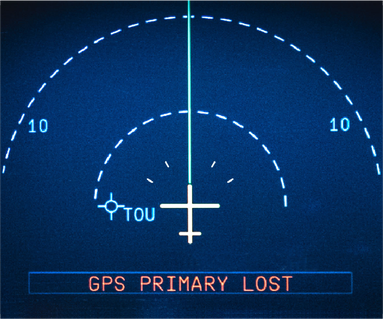
LYON, France—As operators report an increasing number of global navigation satellite system (GNSS) signal losses related to radio frequency interference, Airbus is reminding pilots of the consequences and required action in the cockpit.
Various reasons may explain the loss of GPS signal. It can cause the loss of some navigation and surveillance functions. Built-in redundancies maintain position computation capability.
The power of the GPS signal “is comparable to the power emitted by a 60-watt light bulb located more than 20,000 km [12,000 mi.] away from the surface of the earth; this means the signal could easily be disturbed by any ground source located near an aircraft and emitting in the GPS L1 frequency,” Airbus experts in operations, navigation and security say in a company publication focusing on safety.
The source can be a personal jammer activated in the vicinity of an airport, a protection system around a sensitive site or military activity in a conflict zone. A GPS repeater in a hangar, used for aircraft maintenance, can cause interference with actual GPS signals, the experts note. GPS spoofing and anti-drone measures have not created any problem yet, but Airbus monitors such threats.
Interference can cause the loss of GNSS position and timing. In that instance, the Flight Management System (FMS) will revert to the onboard inertial reference system (IRS) and ground-based navigation aids, such as DME and VOR (distance measuring equipment and VHF omnidirectional range). “A loss of GNSS inputs does not lead to a map shift or an erroneous position computation by the FMS. In the case of a loss of GPS signal, the FMS switches from the mixed GPS/IRS position to an IRS-DME/DME position or IRS-VOR/DME or pure IRS, in order of priority,” the experts explain.
The loss of signal was temporary in most of the reports Airbus received. Nevertheless, there is a list of a dozen systems and functions that can be affected.
The capability for required navigation performance (RNP) operations can be lost. The predictive functions of the terrain awareness and warning system (TAWS) can disappear. The runway overrun protection (ROPS) system may no longer work.
ADS-B Out can be lost, too. If this happens in an area where such automated position reporting is required, pilots should notify air traffic control.
After the flight, the crew should report the problem to the maintenance team. The latter will investigate to confirm whether the event was due to interference or an aircraft system malfunction.
Operators should report any suspected GNSS interference event to air navigation service providers, Airbus’ experts add.





Comments
Iran's missiles targeted the drone hangers in Iraq. Reportedly, they used image matching for terminal guidance and did not use GPS.